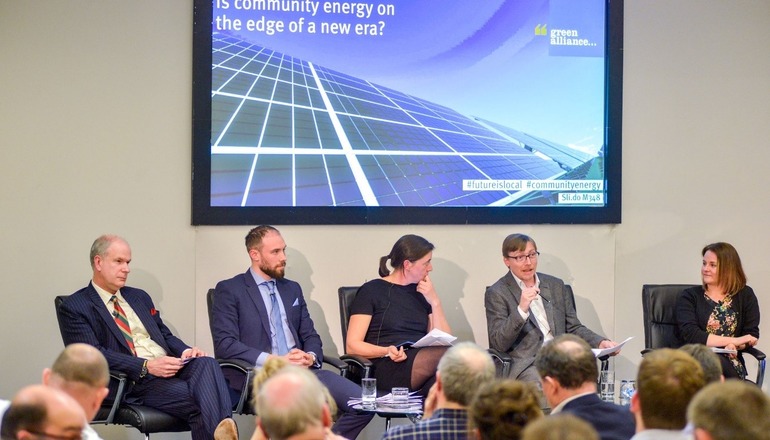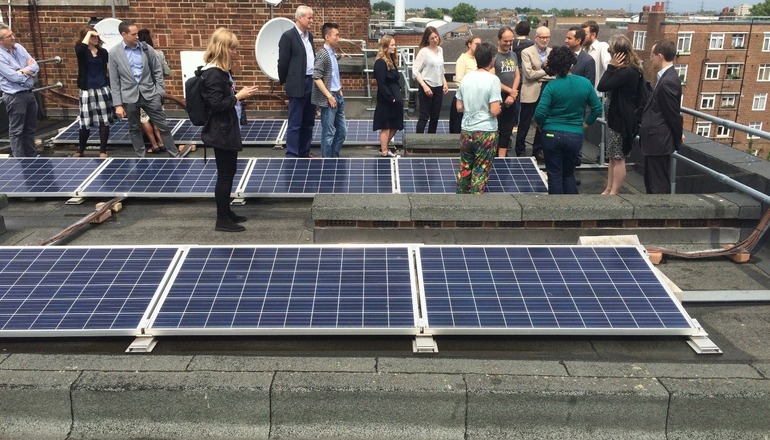Friends Provident Foundation has been highly commended in the 2019 Community Energy Finance Award category of the Community Energy Awards.
Friends Provident Foundation (FPF) is an independent charity that makes grants and uses its endowment towards a fair, resilient and sustainable economic system that serves society. They connect, fund, invest and share learning to shape an economy that works for everyone.
The foundation has been deploying its capital and influence to accelerate the transition to a decarbonised, decentralised and democratised energy system with community energy at its heart. This programme of considerable support, Accelerating the 3D energy transition, has included: grants to national and ground-breaking local groups; investments in community projects; and engagement with energy utilities, other investors, and policy makers.
Since 2017 FPF has provided grants of £1.5m to progress the sector as a whole and support ground-breaking individual projects; made direct investments in community projects of £500k, and crowded in additional investment; engaged every UK energy utility company as a shareholder in support of the 3D energy transition and challenged lobbying activity; and engaged government for a fair policy environment.

Grants awarded by the foundation to support the sector as whole include: Community Energy England for resourcing; Regen SW for work on the role and value of community energy to networks; Leapfrog to produce a tool for monitoring and evaluating social impact; Forum for the Future for its PowerPaired community energy asset bank (an idea co-devised by the Foundation); Institute of Welsh Affairs for looking at the renewable energy potential of Wales, including community energy; and Centre for Sustainable Energy for building capacity in deprived communities for community energy activity.
Whilst grants to support ground-breaking individual projects include: Riding Sunbeams for community solar powered railways; 10:10 and Repowering for separate local energy model pilots with community energy; Repowering for the first community anaerobic-digestion plant; Carbon Co-op for a city region community retrofitting and finance model; Bath & West Community Energy for a neighbourhood energy storage and demand management pilot; and Community Energy Plus for a rural community heat project.

Funding is also awarded to organisations and projects that are working to engage government, energy companies and investors on community energy. Grants include: Green Alliance for its Community Energy 2.0 project with a new ‘Community Energy Manifesto’ of government policy recommendations; Influence Map to investigate and compare the lobbying activity of the ‘Big Six’ energy utilities with regard to the 3D transition, including government policy changes that have undermined community energy; and London School of Economics Grantham Research Institute for investor guidance to support a Just Transition, including recommendations for capital allocation into community energy shares and bonds; putting this investment class firmly on the mainstream investment agenda.
FPF also supports and advises organisations, notably this year in the development of the Green Alliance ‘Manifesto’, when they mobilised several grant recipients to feed into its development. They organised a letter signed by 10 large impact investors and grant makers to the Minister of State for Energy and Clean Growth, asking for community energy to be heard and its added value considered in new energy policy. And held a meeting with BEIS’ Head of Local Energy and Head of Green Finance in support of the Manifesto.
As part of Community Energy Fortnight, the team at FPF organised a ‘Seeing is believing’ tour of community energy projects in London for impact investors and grant makers. The tour visited Energy Garden locations, Banister House community solar, and a 10:10 solar school. The tour leveraged additional investment and grants into the sector.
The foundation also directly invests in community energy including: a community share offer by Awel Community Wind Farm in South Wales to enable refinance and additional community benefit. They also shared their due diligence with other potential institutional investors and secured additional investment from the impact investment fund Snowball. Another direct investment has been a bond offer by Thrive Renewables that enabled asset transfers from commercial to community ownership, including a wind farm in Cumbria and a solar array in the Midlands. The original bond offer prospectus only mentioned refinancing renewable energy projects. The foundation engaged with the organisations to ensure the aspiration to facilitate asset transfers to communities was a firm commitment if they invested, which has now been confirmed.
FPF has also been using their shareholdings in every UK energy utility company to undertake a programme of engagement. They have met every one to discuss: the 3D energy transition; their business model resilience; lobbying activity related to the 3D transition, including challenging lobbying that has undermined community energy; just transition and the role of community energy; and appetite to work with community energy. Thanks to this work EDF has responded positively regarding community energy partnerships and FPF is now working with them to move ‘project commUNITY’ from R&D phase to national roll-out. Similarly, they are supporting Centrica to roll-out their Cornwall local energy pilot and to work more closely with community energy as part of their core business strategy.
FPF is leveraging all the assets at their disposal to drive the community energy sector forwards, to develop innovative new models and system change, and to secure investor, corporate and government support. They are seeking a paradigm shift in the energy system to maximise environmental, social, and local community value.